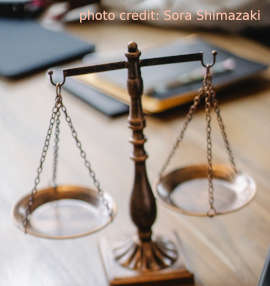Once again I’m going to talk about current events in the United States. Perhaps I should be more concerned with the scene in Europe where I now live; but I’m familiar with things in the U.S.A. and do care about what happens to the people there. And perhaps what I’m going to say here can apply to other countries as well.
 A few days ago, Chief Justice John Roberts of the Supreme Court of the United States (SCOTUS) argued that the common folk have no right to question the legitimacy of the Court’s actions; and in particular, the Court’s decision to overturn Roe v. Wade. In other words, we (the Court) are above criticism.
A few days ago, Chief Justice John Roberts of the Supreme Court of the United States (SCOTUS) argued that the common folk have no right to question the legitimacy of the Court’s actions; and in particular, the Court’s decision to overturn Roe v. Wade. In other words, we (the Court) are above criticism.
Roberts’ answer to the dissent has been to double down on “we can do whatever we want and your job is to do what we say and not say anything yourself about it.”.
This sort of attitude is entirely inappropriate for any branch of the government there — nobody’s perfect, and if you think somebody’s made the wrong call, it’s your duty as a citizen to get up on the rooftops and shout.
Roberts defended the Court saying “I don’t understand the connection between the opinions people disagree with and the legitimacy of the supreme court”. The connection, dear judge, is that many people think you’re wrong, that you are wrong, and that you’re messing up people’s lives by doing something so unpopular. If “the people” are wrong, then it’s time to give up on democracy.
He continues: “If the court doesn’t retain its legitimate function of interpreting the constitution [judicial review], I’m not sure who would take up that mantle. You don’t want the political branches telling you what the law is, and you don’t want public opinion to be the guide about what the appropriate decision is”. I’m not so sure this is a legitimate function. Who gave that power to the Supreme Court to begin with? The court gave it to themselves in their decision of Marbury v. Madison in 1803.
Maybe someone should have that power, but why must it be the judicial branch? As time has gone by, I have trusted the court system less and less. The legal system is arbitrary and capricious, often deciding cases on irrelevant matters, such as the emotions of the defendant and the way they’re dressed. And while I consider myself scrupulously honest, I often don’t come across that way. Like the time I was crossing an international border and was pulled over for “extra” inspection — they found nothing wrong, they just decided I was “suspicious looking”. And no, I’m not a criminal just because I don’t like the justice system — you don’t have to be a criminal to recognize a broken system.
Perhaps constitutional review can be done in a different branch of government, even if a new branch must be created for that purpose alone.
 I’ll let you in on a little secret — much of the time judges have no idea who’s telling the truth and who’s lying — it’s just educated guesswork. The legal system is very arbitrary and capricious, but can be moved in whatever direction by skilled professionals (meaning expensive lawyers).
I’ll let you in on a little secret — much of the time judges have no idea who’s telling the truth and who’s lying — it’s just educated guesswork. The legal system is very arbitrary and capricious, but can be moved in whatever direction by skilled professionals (meaning expensive lawyers).
In one city I lived in, I was called to jury duty, but moved away before I had to report. In my opinion, I could never vote either way based on what seems to be true — I would have to know for certain, as if I saw it for myself. (Of course, if there’s that much certainty, there’s no need for a jury trial in the first place.)
 There’s this city-building computer game I play, where one of the things you can build is a courthouse. I went to a computer forum framed around this game, and wrote a fantasy story about what goes on inside there. (In the actual game, there’s no way to enter a building.) I said:
There’s this city-building computer game I play, where one of the things you can build is a courthouse. I went to a computer forum framed around this game, and wrote a fantasy story about what goes on inside there. (In the actual game, there’s no way to enter a building.) I said:
“Inside the courthouse the defendent stands on the courtroom floor, facing towards the main exit (although one level above the main doors). If the stupid judge decides he’s guilty, he rings a gong and a trap door opens up underneath the defendant and down onto a slide ramp he goes. The ‘ramp’ is actually a slide much as you would find in a children’s playground. It is very slippery, and there’s no place to grab on to to stop your skid. Down you go, and when you get to the bottom of the visible portion, it continues on down to the punishment room. While casual visits to the punishment room are not encouraged, everyone fears it as being a very unpleasant place to go.”
Okay, that’s a bit over the top; but remember, it’s just a computer game. But I got a reply from someone who put my text into the “correct” legalese:
“The defendant stands on the courtroom floor, facing the main exit, inside the courthouse (although one level above the main doors). If the court finds he’s guilty, a gong is rung, and a trap door opens underneath the defendant, allowing him to fall. The defendant begins to scream as he realizes where he is heading and that there is nothing he can do to stop it. This just contributes to the sense that the punishment chamber is a frightening place.”
“If the court finds”? What does that mean? “The court” is an abstraction; there’s no way around the fact that somebody is making the decision. There’s no way the judge can honestly say he didn’t do anything to hurt anybody (this is true whether or not a guilty verdict is deserved).
And “a gong is rung”? — “A trap door opens”? The use of the passive voice suggests “it just happens” without any cause. The closest I’ve come to serious trials has been to watch them on TV cop/lawyer shows, but I get the impression that courtrooms are places where the usual laws of physics don’t apply.
(I asked him if he was a judge but he didn’t reply.)
I make it a point to stay as far away from the legal system as I can.
U.S. Vice-President Kamala Harris has also criticized the Court’s decision, and has questioned Robert’s view that any criticism of SCOTUS is inappropriate.
Let me close with a belief of mine that I’ve had for decades: in my opinion,
the judiciary must be held accountable.
